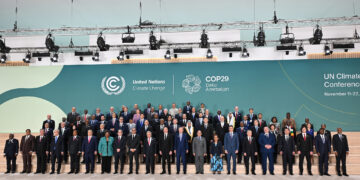The Council and the European Parliament have reached a provisional agreement on the regulation establishing a framework of measures to strengthen Europe’s net-zero technology product manufacturing ecosystem, also known as the ‘net-zero industry act’ (NZIA). The regulation aims to accelerate the industrial deployment of net-zero technologies required to meet the EU’s climate goals, leveraging the strength of the single market to strengthen Europe’s leadership in industrial green technologies.
Under the agreement, there will be a single list of net-zero technologies, along with criteria for selecting strategic projects in those technologies that will contribute the most to decarbonisation.
The net-zero industry act aims to ease conditions for investing in green technologies by simplifying permit-granting procedures and supporting strategic projects. It also proposes facilitating market access for strategic technology products, improving the skills of the European workforce in these sectors (particularly through the establishment of net-zero industry academies), and establishing a platform to coordinate EU action in this area.
To foster innovation, the net-zero industry act proposes creating favourable regulatory frameworks for developing, testing, and validating innovative technologies (known as regulatory sandboxes).
Progress towards the net-zero industry act’s objectives will be measured by two indicative benchmarks: reaching 40% of the production required to meet the EU’s needs in strategic technology products, as well as their evolution in comparison to global production for products such as solar photovoltaic panels, wind turbines, batteries, and heat pumps. The proposal also establishes a specific target for CO2 carbon capture and storage, with an annual injection capacity of at least 50 million tonnes to be reached by 2030.
The provisional agreement supports the Commission’s main objectives for the net-zero industry act, which were proposed less than a year ago, while also introducing several improvements, such as streamlined construction permit procedures, the establishment of net-zero industrial valleys, and greater clarity on public procurement and auctioning criteria.
The new regulation is intended to make conditions easier and more predictable for investors and promoters of net-zero technology manufacturing projects. The projects identified as having the greatest potential for decarbonisation will benefit from expedited permit procedures for construction or expansion and guidance on obtaining financing.
The maximum time limit for delivering a permit for constructing or expanding large net-zero technology manufacturing projects (more than 1 gigawatt) and those not measured in gigawatts is 18 months. Smaller projects (less than 1 gigawatt) will have a 12-month permit delivery time limit. Shorter deadlines will be set for strategic projects. In addition, regardless of time constraints, the procedure will ensure that such projects are safe, secure, and environmentally sustainable and meet environmental, social, and safety standards.
The future regulation will promote the development of net-zero acceleration ‘valleys’ (territories that concentrate several companies involved with a certain technology). The goals of those valleys are to create clusters of net-zero industrial activity to increase the EU’s attractiveness as a location for manufacturing activities while also streamlining the administrative procedures for establishing net-zero manufacturing capacity. They will aid in the reindustrialisation of regions.
The rules governing how public authorities will purchase goods, works, and services related to strategic net-zero technologies are intended to ensure that requirements are transparent, implementable, and harmonised and that the supply of those technologies to the EU is diverse while providing sufficient flexibility to contracting authorities.
The act passed governs the use of incentive schemes for the purchase of net-zero technology products and defines sustainability and resilience contributions in public procurement procedures. The environmental sustainability contribution will be a minimum requirement, while the resilience contribution will be applied if a third-country dependence on a specific strategic net-zero technology (or its components) exceeds 50%. This criterion will be considered only after the Commission has determined the level of dependence on each technology from a specific third country.
The provisional agreement states that when a member state designs an auction for the deployment of renewable energy technologies, it will be able to use both pre-qualification and award criteria that are not price-related, such as environmental sustainability, contribution to innovation, or energy system integration. These criteria must apply to at least 30% of the volume auctioned annually per member state. The Commission will define the procurement and auctioning criteria and revise the auction volume based on an assessment of the system’s operation.
The provisional agreement now requires endorsement and formal adoption by both the European Parliament and the Council. The NZIA is a key legislative initiative of the Green Deal Industrial Plan, aligned with the Critical Raw Materials Act and the electricity market design reform, aimed at enhancing Europe’s net-zero industry competitiveness and facilitating a rapid transition to climate neutrality.





